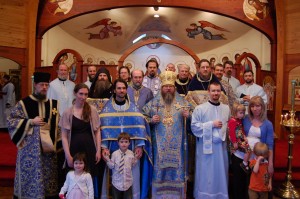Green-Rainbow Party Notes Progress in 2010 Election
USCIRF Condemns Terrorist Attack on Baghdad Church
Priest Dismissed for Wearing a Cassock!
 |
| The Offending Garment |
Now only those involved have the entire story and I certainly do not advocate making disparaging remarks against ones bishop but this does seem a little extreme to me. Throwing a parish into disarray is never a good thing and this priest has not only been dismissed as pastor of the church but has been dismissed from the Archdiocese as well. I would ask where is the pastoral concern for the priest, his family, the congregation, and the congregation of the priest that was removed from another parish and sent to this one. The priest sent to replace the one removed was priest at his church for more than 20 years! what has this done to that community? BTW the accused priest denies making any remarks against +Philip.
Again I would say that as a priest we should not make disparaging remarks against our bishops in public but if they have gone off the reservation then I think we have an obligation to speak up. Bishops in the Orthodox Church are in infallible and do make mistakes and need to be held accountable they are not autocrats.
+Philip has made it clear in an October 22nd directive that he will not tolerate any dissent in the Archdiocese and it seems that he is making good. When a bishop removes the voice of his clergy he is entering a very dangerous area. The priests and bishops are supposed to work together in a collegial way, yes the bishop is in charge, but he is not an absolute ruler our Orthodox polity would not support that.
I fear this is only the start of situations like this. Priests and most importantly bishops have an obligation to care for the needs of those placed under him. The priests serve in the parish as the bishops representative, it is not the priests parish, nor the people’s for that matter, but the bishops. There was very little pastoral concern shown here in this situation, again we do not know the entire story but based on the letter from +Philip and the priest wrote in his own bulletin, I think I have the facts pretty clear.
We have shortage of clergy in America and we need all the good ones we have. Let us pray that this priest finds another home to minister in the ministry that God has called him too.
God save His church from tyrannical bishops!
November 3 ~ Winefride of Treffynon
 In Welsh her name is Gwenfrewi. She was the niece of the great Saint Beuno the Wonderworker and she lived with her parents higher up the valley from his cell and wattle chapel, on the hill where the parish church now stands. According to tradition, Caradoc the son of a local chieftain sought refreshment from her while out hunting and then attempted to seduce her. She repelled his advances and ran towards her uncle’s chapel for sanctuary…
In Welsh her name is Gwenfrewi. She was the niece of the great Saint Beuno the Wonderworker and she lived with her parents higher up the valley from his cell and wattle chapel, on the hill where the parish church now stands. According to tradition, Caradoc the son of a local chieftain sought refreshment from her while out hunting and then attempted to seduce her. She repelled his advances and ran towards her uncle’s chapel for sanctuary…
Caradoc pursued her and in a rage struck off her head with his sword. A spring of water began to flow where her head fell. Saint Beuno replaced her head and, through fervent prayer to the Saviour, she was brought back to life.
Saint Winefride began to follow the monastic life, under the spiritual direction of Saint Eleri. She remained with her uncle until he moved to Clynnog Fawr on the Lleyn peninsula. Then, after staying briefly at Bodfari and Henllan near Denbigh, Saint Winefride travelled west to the hills high above the Conwy valley and there she established a monastery of nuns in the village of Gwytherin. She passed to her reward, still relatively young, in about the year 650 and she was laid to rest by Saint Eleri who had first professed her.
The saint’s relics were taken to the Benedictine abbey at Shrewsbury in 1138, remaining there until they were despoiled and scattered during the Reformation. Only one finger remained and this precious relic is today preserved and venerated in the Roman Catholic church in Holywell. At Gwytherin no memory of her remains, apart from the dedication of the church, for her stone chapel was demolished 300 years ago. Her great bell, which could only be tolled by four men, was broken up for scrap in 1730.
It is above all at Holywell that Saint Winefride is remembered. Through her intercessions, many miracles have been worked at the Holy Well, which can claim to be the oldest place of unbroken pilgrimage in Britain. In 1416 Henry V went there on foot from Shrewsbury to give thanks for his great victory at Agincourt. The visits of pilgrim have never ceased and we too shall be of their number. For us Saint Winefride is united in Orthodox faith with Alban our protomartyr, with David and Beuno, Cuthbert and Aidan, Columba and Patrick – with all the Holy Orthodox saints of the undivided Church whose light has shone in our land.
At His baptism in the Jordan, Christ redeemed a distorted and unbalanced natural order, transforming water into a channel of grace and healing. May it be so for us all as we receive the holy water of His saint.
The Troparion of Saint Winifride in Tone 4.
Suffering death for your virginity, O holy Winifride, through God’s mercy your body was made whole and restored to life. Thy healing grace flows in streams of living water. Pray to God for us, that our souls may be saved.
The Chapel and Well:
The chapel of Saint Winefride (1490‑1500) is a gem, with many interesting decorative carvings in the nave and sanctuary. It was built through the munificence of Margaret, Countess of Richmond, whose son ascended the throne as Henry VII after his victory at Bosworth Field. The chapel is bare of all furnishings except on our pilgrimage when the chapel is once again set up as an Orthodox church. The well is presently undergoing a major restoration by CADW and this year we will have to put up with the continuing presence of scaffolding within the well-house. The work does not prevent us from blessing the waters and, for those who wish to, entering the pool itself.
The Day After
So last night I did my usual election night routine and watched the returns come in. Bouncing back and forth between several news networks and keeping an eye on the Internet. I would say that Boston.com had the best coverage with interactive maps so you could see how your community voted on each ballot line. Very interesting.
Some were winners and some losers and that is the name of the game. This was an important election, more so then any other mid-term election. Massachusetts politics continues to confuse me. All 10 Congressional seats went to Democrats but in the two Massachusetts House districts near me, but democrats were beaten, one by only 2 votes. Let that be a lesson on the whole Get the Vote out thing by the way. Republicans picked up some seats in the House and maybe they will start to become a force for change on Beacon Hill. I am also proud to say that my home town of Quincy will be sending it’s first Asian American to the State House. I was also happy to see Nicki Haley in South Carolina win election as governor, the second Indian American to win high office. I was also pleased to see the large number of young people elected, I do believe our future is bright.
I have written before that our country is bigger than one person or party. We all need to work together and support each other more so now in the bad times, and we need to urge our leaders to put their egos behind them and get the job done, we need to you to get the job done, we put you in office to get the job done. I will say this, I hope you have learned from this election that if you do not produce, or do things that “We the People” don’t like you will be one of those looking for work. Get to work and fix this mess! You may not have created it but you HAVE to fix it.
In the end the House went to the Republicans and the Senate stayed with the Democrats, now it is time to put it all behind and work together. The incoming Speaker of the House Representative John Boehner of Ohio said last night that he hopes the President has heard the people and will adjust his agenda accordingly. He continued that if he does this we will work with him, I hope he does. The mid term elections of Bill Clinton’s first term saw similar results and he modified his agenda and won re-election to a second term and the country moved forward. If the President digs in his heals “We the People” will suffer. Mr. President you cannot always get what you want, but if you put your ego aside and work with people you will accomplish much and maybe pull us up. We can only hope.
The hard work now begins. I congratulate those who won and I also congratulate those who lost for running. I know what it takes to put yourself forward, it is not easy and it takes time away from family and other things so thank you to all who ran you should all be proud of what you have done. The Democrats swept all 10 Congressional Districts here in Massachusetts but the opposition made them work for it. I would say stay involved and keep making your voice heard.
I will continue to pray for our leaders and that they will listen more and talk less. We need the government to work, and work together. This could be a great two years or a really bad two years, but it will get worse before it gets better.
God Bless America!
Election Night ~ Open Thread
11:06pm ~ Looks like Dems will sweep all 10 Congressional Distrcits in Massachusetts. Rep make some gaines in New England.
10:10 pm Ballot Questions
Question 1 Yes 51% No 49%
Question 2 Yes 41% No 59%
Question 3 Yes 43% No 57%
10:08 pm ~ WBUR is predicting Gov Patrick wins re-election
9:15 pm ~ CNN Projects Republicans will take control of the House of Representatives. No big surprise there.
8:49 pm ~ With 4% reporting here is how it looks:
Governor
Patrick ~ 50%
Baker ~ 41%
Cahill ~ 7%
Stein ~ 2%
Ballot Questions
Question 1 Yes 52% No 48%
Question 2 Yes 52% No 48%
Question 3 Yes 52% No 48%
7:38 pm ~ I need to make one correction. Garrett Quinn does not work for the Globe they just prommote his blog.
7:12 pm ~ Well it is finally here. Polls are starting to close and at 7:12pm the Republicans have picked up one seat in the Senate. Let’s see if this is the start of the wave.
I will be updating this post as the night goes on and results come in. I will start with some predictions. Feel free to add your own in the comments.
Garrett Quinn of the Boston Globe makes these predictions:
Massachusetts
Governor: Patrick (D) but not by much
Treasurer: Polito (R)
Ballot Question:
Question 1: Pass
Question 2: Fail
Question 3: Fail (He makes an interesting observation that if the roll back had been to 5% rather than 3% it would have passed. We shall see)
The race to watch is the 10th Congressional District where he is predicting Jeff Perry (R) will win. This will be big for Republicans but the 10th is the most Conservative district in Massachusetts so I really will not be surprised.
Because of some moves he predicts that the Republicans will pick up some seats (10 – 12) in the Massachusetts House but will loose one in the Massachusetts Senate.
A Prayer for our Country
Almighty God, who hast given us this good land for our heritage; We humbly beseech thee that we may always prove ourselves a people mindful of thy favour and glad to do thy will. Bless our land with honourable industry, sound learning, and pure manners. Save us from violence, discord, and confusion; from pride and arrogancy, and from every evil way. Defend our liberties, and fashion into one united people the multitudes brought hither out of many kindreds and tongues. Endue with the spirit of wisdom those to whom in thy Name we entrust the authority of government, that there may be justice and peace at home, and that, through obedience to thy law, we may show forth thy praise among the nations of the earth. In the time of prosperity, fill our hearts with thankfulness, and in the day of trouble, suffer not our trust in thee to fail; all which we ask through Jesus Christ our Lord. Amen.
h/t AtonementOnline
Why I am Voting Green
Massachusetts Green Party
If you Don’t live in Massachusetts check out the other Green candidates at the Green Party of the USA




